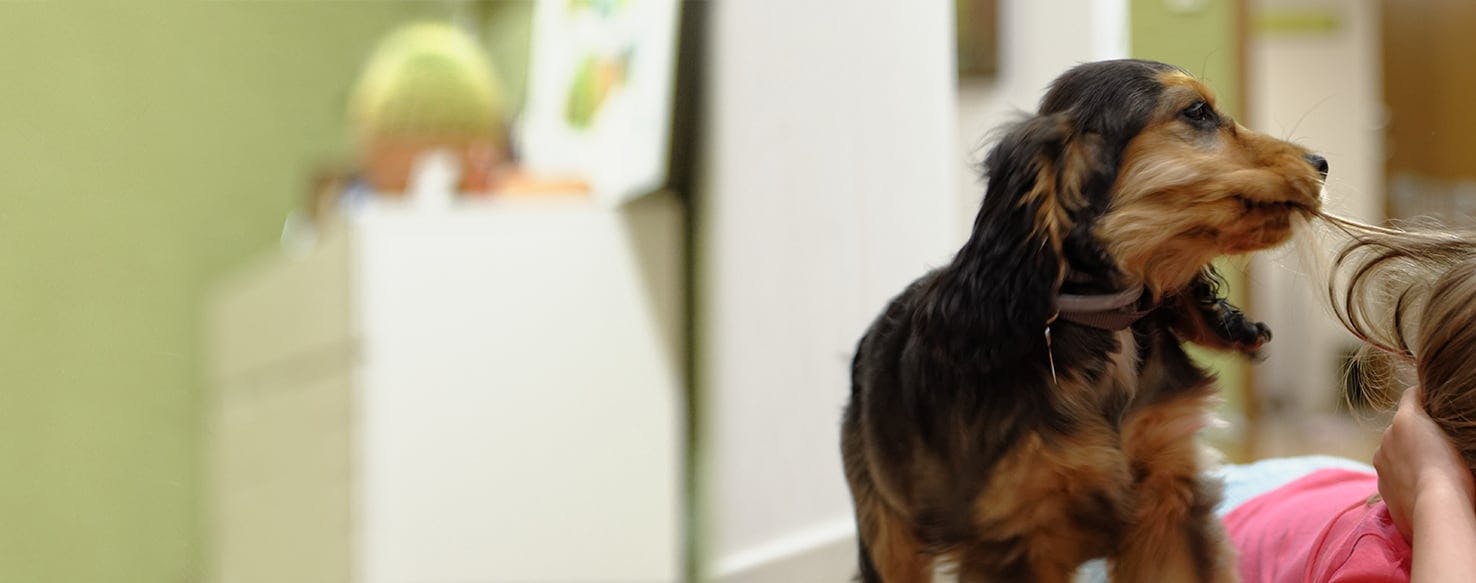- Home
- The Daily Wag!
- Behavior
- Why Do Dogs Play With Hair

Unusual
Irregular
Most of you have experienced your pups pulling, tugging, or biting at your hair. Whether it's that you wake up to your dog wrestling your hair or you have multiple canines playing tug-of-war, you know this quirk all too well. And while this act could potentially be worrisome, most of us allow it. It is, after all, attention from our furry friends. But have you ever stopped and asked yourself why dogs like to play with hair? What is about long locks and beards that is so intriguing to our canine companions? Unfortunately, there is not a lot of research available on the topic, but there are a few experts who have offered their opinions.
It may not come as such a surprise that one theory for why your pup plays with hair is that he or she simply likes the texture and feel of it. There are humans who love to sit and play with the hair of their daughter or friend, so why should it be different for our canine companions? Granted, humans don't use their mouths to play with one another's hair (usually), but the idea of enjoying the texture is the same. It may be that your pup just really likes the silkiness of your tresses or the coarse roughage of your beard. Either way, the texture may play a large role in this particular behavior. Another popular idea is that Fido just may be trying to get you to interact with them. By biting or tugging at your hair it may be your pup's way of saying "Hey, pay attention to me. It's play time."
Especially if you have long hair or a long beard, your pup could be trying to engage in a serious game of tug-of-war. We all know how much many of our furry friends love a rousing game of tug. So it would stand to reason that your pooch would see hair as a new device for this purpose. On a less positive note, playing with your hair could also be a sign of anxiety. Some experts think that this behavior is a nervous habit some dogs develop for a myriad of reasons. If it seems that your fur baby is upset or acting a little 'off' when he or she is playing with your hair, you should give your vet a call. While the act itself may not be so troublesome, the reason behind the anxiety should be addressed. Your veterinarian can help you get to the bottom of any underlying issues that may have brought about the hair obsession.
Need advice about your pet's health?
Get answers fast from a veterinary professional 24/7 in the Wag! App.
Get Vet ChatBefore you can decide on how to handle the odd habit of playing with hair from your pup, you may want to talk to your vet or trainer for their advice. In younger puppies, this behavior could be temporary and stem from a sort of separation anxiety when leaving their mother and their litter. In this case, it could be as simple as just giving your pup time to grow out of the habit. With a little time to bond with their new pack, many dogs have stopped playing with and chewing on their owner's hair.
If your dog is older when they start playing with hair then you will want to try to determine why he or she has picked up this new habit. Whatever the reasoning behind it, allowing your dog to continue playing with hair is a personal decision each pet owner must make for themselves. The argument of what should and should not be encouraged when it comes to our canine companions is everlasting. And there will always be those on both sides with very strong opinions. In the end the decision should be entirely up to you, and with the guidance of your vet when you may be in doubt.
The question of whether or not this particular behavior should be encouraged is quite debatable. Since there are health risks associated with your dog possibly ingesting excessive amounts of hair when playing with it, many vets recommended not allowing this. With the ingestion of unusual amounts of hair comes the risk of intestinal blockage. This will result in the accumulation of any solid foods and fluids in your pup's stomach. Intestinal blockages can have a variety of symptoms, including vomiting, diarrhea, anorexia, and weight loss. So due to the risk of such severe consequences, breaking this habit may be in the best interest of your fur baby.
The rule of thumb when it comes to your fur baby is always that a healthy dog equals a happy dog. We all want our sweet little Fidos to live long and happy lives. We have, after all, chosen to become their pack leader and assume the duty of their well-being. Whatever you decide, enjoy all of the attention and be sure to let your pup know just how much you love them!
Written by a English Mastiff lover Dena Withrow
Veterinary reviewed by:
Published: 04/05/2018, edited: 01/30/2020

